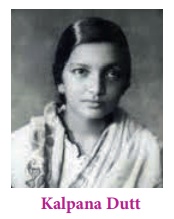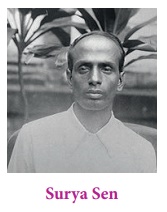Kalpana Dutt (1913–1995)
In the late 1920s a young woman, Kalpana Dutt (known as Kalpana Joshi after her marriage to the communist leader P.C. Joshi), fired the patriotic imagination of young people by her daring raid of the Chittagong armoury.

To understand the heroism of Kalpana Dutt, you should understand the revolutionary strand of nationalism that attracted women like her to these ideals. You have alreay learnt that there existed many revolutionary groups in British India. The character of these organisations gradually changed from being ones that practiced individual annihilation to organising collective actions aimed at larger changes in the system.
As Surya Sen, the revolutionary leader of Chittagong armoury raid, told Ananda Gupta, ‘a dedicated band of youth must show the path of organised armed struggle in place of individual action. Most of us will have to die in the process but our sacrifice for such noble cause will not go in vain.’ When revolutionary groups like the Yugantar and the Anushilan Samiti began stagnating in the mid- 1920s, new groups sprang out of them. Among them, the most important group was the one led by Surya Sen, a school teacher by profession, in Bengal. He had actively participated in the Non-cooperation movement and wore Khadi. His group was closely working with the Chittagong unit of the Indian National Congress.
Chittagong Armoury Raid
Surya Sen’s revolutionary group, the Indian Republican Army, was named after the Irish Republican Army. They planned a rebellion to occupy Chittagong in a guerrilla-style operation. The Chittagong armouries were raided on the night of 18 April 1930. Simultaneous attacks were launched on telegraph offices, the armoury and the police barracks to cut off all communication networks including the railways to isolate the region. It was aimed at challenging the colonial administration directly.

The revolutionaries hoisted the national flag and symbolically shouted slogans such as Bande Matram and Inquilab Zindabad. The raids and the resistance continued for the next three years. Often, they operated from the villages and the villagers, gave food and shelter to the revolutionaries and suffered greatly at the hands of police for this. Due to the continuous nature of the actions, there was an Armoury Raid Supplementary Trial too. It took three years to arrest Surya Sen, in February 1933, and eleven months before he was sent to the gallows on 12 January 1934. Kalpana Dutt was among those who participated in the raids.
On 13 June 1932 in a face- to-face battle against government forces, two of the absconders of the Armoury Raid were killed, while they in turn killed Capt. Cameron, Commander of the government forces in the village of Dhalghat in the house of a poor Brahmin widow, Savitri Debi. After the incident the widow was arrested together with her children. Despite many offers and temptations, not a word could the police get out of the widow. They were uneducated and poor, yet they resisted all the temptation offers of gold and unflinchingly could bear all the tortures that were inflicted upon them.
—From Kalpana Dutt’s autobiography Chittagong Armoury Raiders’ Reminiscences.
Women in Action
While Bhagat Singh represented young men who dedicated their lives to the freedom of the country, Kalpana Dutt represented the young women who defied the existing patriarchal set up and took to arms for the liberation of their motherland. Not only did they act as messengers (as elsewhere) but they also participated in direct actions, fought along with men, carrying guns.
Kalpana Dutt’s active participation in the revolutionary Chittagong movement led to her arrest. Tried along with Surya Sen, Kalpana was sentenced to transportation for life. The charge was “waging war against the King Emperor.” As all their activities started with the raid on the Armoury, the trial came to be known as the Chittagong Armoury Raid Trial.
Kalpana Dutt recalls in her book Chittagong Armoury Raiders Reminiscences therevolutionary youth of Chittagong wanted “to inspire self-confidence by demonstrating that even without outside help it was possible to fight the Government.














